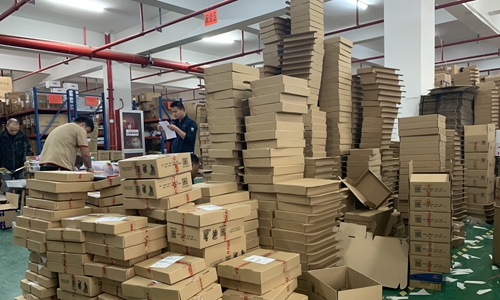
Search history
Clear allSearch by image
XDrag and drop an image here or upload an image
Max 5MB per image
UploadSign In | Join

Search history
Clear allSearch by image
XDrag and drop an image here or upload an image
Max 5MB per image
UploadSign In | Join
X Email Mobile
Chinese express delivery firms speed up green packaging

Boxes to be used for packaging pile up at a sports manufacturer in Yiwu, East China's Zhejiang Province on Tuesday. Photo: Ma Jingjing/GT
Major Chinese express delivery companies and e-commerce platforms are taking active measures in reducing the use of packaging materials, while a complete packaging garbage recycling industry chain and a more powerful regulation are still needed to green the industry.
On Thursday, the Global Times saw several black packaging boxes at a SF Express service point in Yiwu, East China's Zhejiang Province. They feel harder than common paper boxes.
Shi Huajie, manager of the service point, said they are recyclable packaging boxes and can be reused for an average of about ten times. "When our delivery drivers go to collect parcels, they provide the box to our clients for free. After the parcels are delivered in the hands of clients, the boxes are free for use next time," he said.
SF Express has adopted a total of over 100,000 such boxes in domestic first-tier cities and some second-tier cities, in order to replace paper boxes and plastic bags and to reduce the consumption of foam blocks and tape, Shi said.
The company's efforts are a response to the country's call for green development of the logistics industry. In March, the State Post Bureau (SPB) held a conference for courier companies, asking to use electronic waybills, reduce over-packaging in e-commerce and increase the use of environment friendly packaging materials.
The Yiwu branch under SPB told the Global Times on Thursday that 99 percent of delivery packages sent off from the city by major courier firms have used electronic waybills to reduce the use of paper sheets, while 260 service points in the city have recycling bins offering reused boxes for free.
The city also made optimization to logistics bus routes to shorten shipping distance, while boosting the use of new-energy vehicles to reduce the emission of carbon dioxide.
Yiwu is only a third-tier city with about 2.2 million population but its status as the world's largest wholesale market of small commodities makes it rank top 3 in terms of the number of packages delivered.
Data from the Yiwu branch showed that in the first seven months of this year, nearly 2.3 billion packages were sent from and to Yiwu, up 76 percent year-on-year.
This year's "Double 11" shopping spree saw major e-commerce platforms' sales reach a new high. Sales on Alibaba Group's Tmall hit 268.4 billion yuan ($38.3 billion), sales on JD.com surpassed 204.4 billion yuan, and Suning.com Co saw the number of orders up 76 percent year-on-year.
The SPB estimated a total of 2.8 billion packages will be sent during the delivery peak season from Monday to November 18.
Complete industry chain
But there are obstacles impeding the promotion of recycling packaging bags and boxes, as the parcels are delivered to millions of households and as a result collecting packages is a huge project, Liu Jianxin, a director at the China Society of Logistics, told the Global Times.
The green development of the sector requires cooperation among the upstream and downstream industries, including factories, e-commerce platforms, couriers and consumers, Liu said. "A complete industry chain needs to be set up," he said.
Even package boxes can be recycled, they may already have been heavily taped up or severely damaged and therefore can't be reused without large costs for further processing, Liu said, noting that professional companies are needed to process the recollected boxes.
To reduce packaging waste created by online shopping, Alibaba has launched recycling stations for unwanted shipping boxes and bags at 40,000 service points through its Cainiao Smart Logistics Network across the country, while its express delivery partners set up an additional 35,000.
On Wednesday, Cainiao will cooperate with ZTO Express, Yunda Express and others to launch a box recycling day across the country, calling for recycle one box each in a bid to raise consumers' awareness.
More efforts needed
Compared with packaging recycling, a better solution is using degradable plastic bags, but the cost is a little bit high, Liu said.
Li Erqiao, general manager of Soton Daily Necessities Co, a plastics drinking straw company based in Yiwu, told the Global Times on Thursday that the cost of degradable plastics is about four to five times that of polypropylene (PP) plastics.
If companies plan to completely replace PP plastic bags, their cost would increase a lot, he said.
Ma Shengjun, head of the SPB, said at a press briefing in Beijing in September that current regulations on packaging is too "soft" to regulate, according to a report on the bureau's website.
The Standing Committee of the National People's Congress, is now in the process of assessing a new draft on control of environment pollution caused by solid wastes which asking relevant departments to set industry standards to prevent over packaging, Ma continued.
In October, the State Administration for Market Regulation published a draft packaging standards that will restrict express delivery companies to an approved list of recyclable materials.
Besides, various local governments also step up the promotion of green development of the industry. South China's Hainan Province recently announced it is mulling to release more measures to boost green packaging and strengthen supervision and management.
TOP